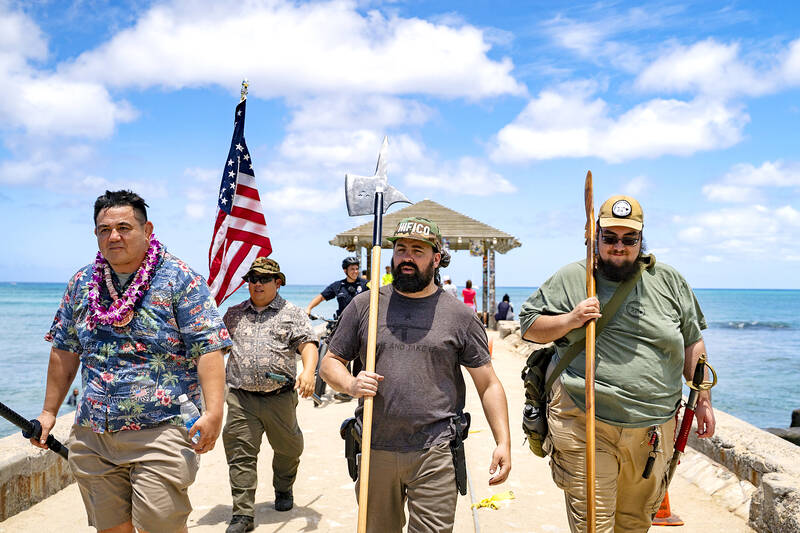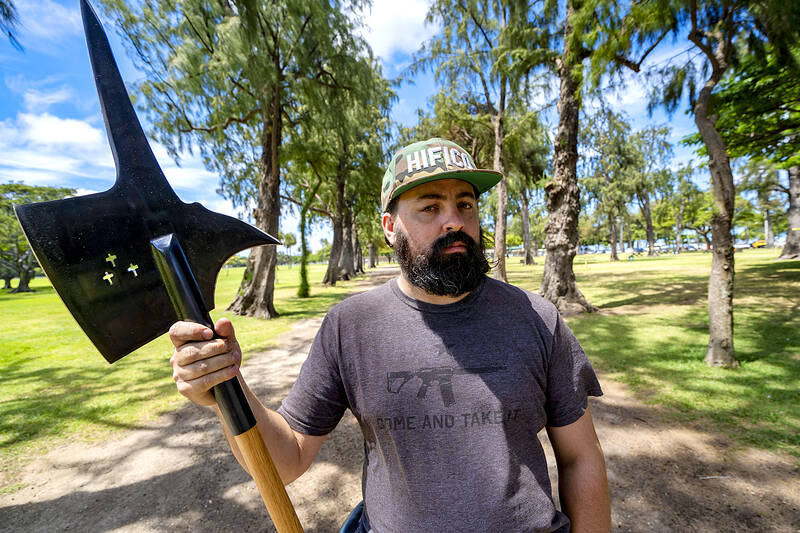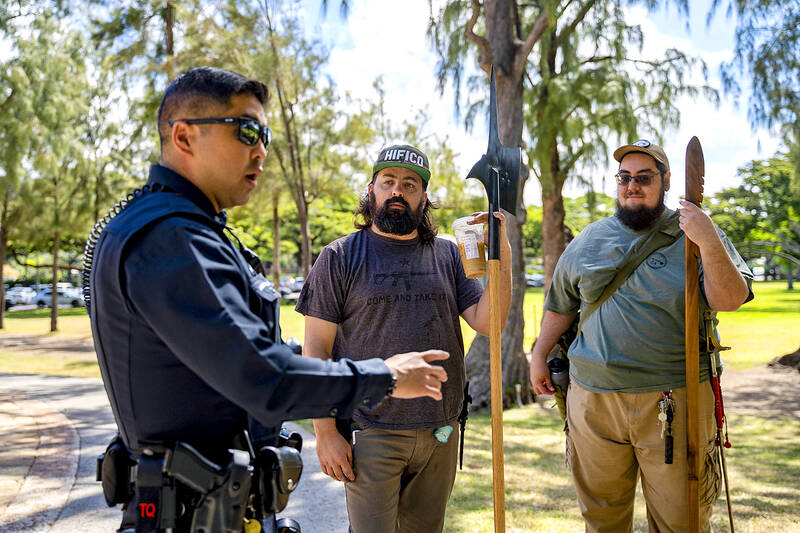Hawaii’s tourist hotspot of Waikiki is known for bikinis, shopping and surfboards. But resident Andrew Roberts has recently introduced a different item on evening walks through his neighborhood: a long-poled battle-axe.
Roberts, director of the nonprofit Hawaii Firearms Coalition, has been taking the 15th-century-style European halberd on strolls since May. That’s when Hawaii loosened its weapons laws in response to the US Supreme Court’s 2022 decision that Americans have a right to carry firearms in public for self-defense.
The so-called Bruen decision upended gun laws nationwide, but especially in Hawaii, which long had some of the country’s toughest restrictions — and some of the lowest rates of gun violence.

Photo: AP
A subsequent federal appeals court ruling applied Bruen to the state’s ban on butterfly knives and found it unconstitutional. While that case and others related to Hawaii’s weapons laws continue to be litigated, lawmakers responded this year by passing a measure that generally allows deadly or dangerous weapons to be openly carried in public. Previously, anyone found armed with them was subject to immediate arrest.
The new law is providing opportunities for some to connect with Native Hawaiian and other cultures through traditional weapons. It’s also generating concern that as the display of weapons becomes more common, people will be more likely to use them.
‘TRUE BELIEVER’

Photo: AP
Roberts called himself a “true believer in the Second Amendment.” He said his walks with the halberd or a shorter battle-axe help promote awareness of the laws and ensure police don’t give him a hard time about being armed with unusual weapons.
“I get stopped probably two or three times on an average evening walk and just have a conversation about what gun laws are in Hawaii and what the weapons laws are,” he said.
On a recent Saturday morning, a halberd-toting Roberts gathered with other coalition members in Waikiki’s sprawling Kapiolani Park. A few carried samurai swords. One had a butterfly knife — also known as a balisong, prominent in martial arts in the Philippines, where many Hawaii residents have roots. A wooden, Scottish sword dangled from the waist of a man in a red kilt.

Photo: AP
Honolulu police officers, who got wind of their plans to march through Waikiki in celebration of the law, chatted with them. Roberts told one he got his halberd blade on Amazon for US$56 (about NT$1,790). With officers escorting them, they strolled along Waikiki’s main oceanfront drag, Kalakaua Avenue. Some tourists did double takes, but many seemed unfazed by the armed men bearing a large US flag.
“Nobody’s been overly shocked,” Roberts said. “It’s just an opportunity to talk to people about what’s going on in Hawaii, talking about Second Amendment rights.”
NO FREE-FOR-ALL
In a statement, the Hawaii attorney general’s office stressed that the new law didn’t create a free-for-all when it comes to carrying weapons in public.
“The notion that you can just carry weapons however and wherever you want is simply not correct,” it said. “There are numerous existing laws and regulations that govern the use and possession of weapons in many respects. All of these laws will continue to be enforced.”
It remains a misdemeanor to carry the weapons in a concealed fashion, and the law increased the penalties for carrying them while committing a crime. It’s also illegal to carry a weapon in a way that threatens harm or terrorizes other people.
While bladed weapons and clubs are not as dangerous as firearms, they don’t belong on the street, said Chris Marvin, a Hawaii resident with the gun-violence prevention group Everytown for Gun Safety.
“I totally can understand the self-defense argument that people make and I would rather they choose to use a knife or a blunt instrument over a firearm, but the cultural attitude that we’re starting to adopt is not the norm for Hawaii,” he said. “In making these laws, we’re becoming more and more like the mainland, which is full of aggressive, argumentative people who resort to violence too quickly.”
TRADITIONAL ROOTS
Michael Rice carried a wooden spear on his hourlong bus ride to the Waikiki gathering. Studying traditional weaponry like the spear, which his uncle made from koa wood, has helped him connect to his Native Hawaiian roots: “I don’t get to express my culture that often.”
Soleil Roache, a self-defense instructor who did not attend the walk, said the law now allows her to incorporate the balisong into her lessons and to learn about its importance in the Philippines, where her grandfather was from. The law gives her the “opportunity to dive into that part of my ancestry,” she said.
Filipino martial arts instructor Burton Richardson said he can now teach and practice in public parks using weapons, including balisong. “In the Philippines, the tradition of knife, stick and sword fighting ... has been important to the culture,” he said.
The weapon has two pivoting handles that open and close, like butterfly wings, and aficionados make deft work of flashing the blade.
Umi Kai, who makes traditional Hawaiian weapons such as spears, daggers and clubs, was not part of the walk. He mostly uses the implements for ceremony or education; they’re impractical for self-defense in modern Hawaii, he said.
“For self-defense I wouldn’t be carrying around a shark-tooth-laden club every day,” he said.

Towering high above Taiwan’s capital city at 508 meters, Taipei 101 dominates the skyline. The earthquake-proof skyscraper of steel and glass has captured the imagination of professional rock climber Alex Honnold for more than a decade. Tomorrow morning, he will climb it in his signature free solo style — without ropes or protective equipment. And Netflix will broadcast it — live. The event’s announcement has drawn both excitement and trepidation, as well as some concerns over the ethical implications of attempting such a high-risk endeavor on live broadcast. Many have questioned Honnold’s desire to continues his free-solo climbs now that he’s a

Lines between cop and criminal get murky in Joe Carnahan’s The Rip, a crime thriller set across one foggy Miami night, starring Matt Damon and Ben Affleck. Damon and Affleck, of course, are so closely associated with Boston — most recently they produced the 2024 heist movie The Instigators there — that a detour to South Florida puts them, a little awkwardly, in an entirely different movie landscape. This is Miami Vice territory or Elmore Leonard Land, not Southie or The Town. In The Rip, they play Miami narcotics officers who come upon a cartel stash house that Lt. Dane Dumars (Damon)

Francis William White, an Englishman who late in the 1860s served as Commissioner of the Imperial Customs Service in Tainan, published the tale of a jaunt he took one winter in 1868: A visit to the interior of south Formosa (1870). White’s journey took him into the mountains, where he mused on the difficult terrain and the ease with which his little group could be ambushed in the crags and dense vegetation. At one point he stays at the house of a local near a stream on the border of indigenous territory: “Their matchlocks, which were kept in excellent order,

Today Taiwanese accept as legitimate government control of many aspects of land use. That legitimacy hides in plain sight the way the system of authoritarian land grabs that favored big firms in the developmentalist era has given way to a government land grab system that favors big developers in the modern democratic era. Articles 142 and 143 of the Republic of China (ROC) Constitution form the basis of that control. They incorporate the thinking of Sun Yat-sen (孫逸仙) in considering the problems of land in China. Article 143 states: “All land within the territory of the Republic of China shall